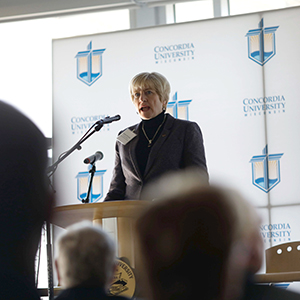
“The nation’s health care crisis is bigger than what any one segment can tackle alone. It’s time that everyone gets involved in health care.”

The assertion made by Dr. Barbara McAneny, the American Medical Association’s incoming president, was delivered to an audience of about 150 business executives/health care providers on Wednesday, April 11, on Concordia University Wisconsin’s campus.
McAneny, who is poised to take the helm of the nation’s largest physician organization, was the keynote speaker for the second annual Healthcare Economics Summit, an effort of Concordia’s Batterman School of Business and Remedium eXchange (Rx), a Concordia-led think tank comprised of Wisconsin business leaders who share a goal to consumerize health care by incentivizing, educating, and empowering consumers in transparent markets.
McAneny kicked off the event by laying out the concern: America ranks 19th in overall health outcomes and 43rd in life expectancy despite the fact the nation spends almost double the amount of any other industrialized nation, according to 2014 data.
“If we continue as we have been, we will not have any money left,” McAneny stated. “We cannot spend all of our discretionary income on health care. This system cannot continue as it is. We’re going to have to look at all people; not just employers, not just doctors, but also patients.”
The summit tackled the health care concern from a variety of angles by bringing together an impressive roster of health care, business, and thought leaders from across the nation.
The morning event also included an address from Dr. John Raymond, president of the Medical College of Wisconsin, as well as panel discussions on the topics of “The Current Model of Insurance—What’s Wrong, and How to Fix It”, “Healthcare Challenges and Solutions, by Wisconsin Employers”, “Industry Trends: Amazon/JP Morgan/Berkshire; CVS/Aetna; Aurora”, and “Health Rosetta & the CEO’s Guide to Restoring the American Dream”.
“It’s about getting people to realize that the problem with our health care system is that the normal metrics that we apply when we buy a shirt, a vacuum cleaner, a car, a house, we ignore,” said Lake Normal Benefits CEO David Contorno following his panel discussion on how to deliver world-class healthcare to employees at half the cost. “Everyone—the providers of services, the payers of services, and the consumers of health care—we ignore those basic tenants and it’s time we all wake up. We have a major crisis and I think if the people in this room don’t fix it, the government is going to try and that’s not going to be good for any of us.”

The summit concluded with a Skype call from Al Lewis, founder of Population Health Alliance and Quizzify, who issued a challenge to those in attendance: a $3 million award to anyone who can show that wellness programs work.
It’s the second year Concordia has hosted the Healthcare Economics Summit. Last year’s inaugural event focused on the importance of market transparency and welcomed Wisconsin Gov. Scott Walker as a speaker.
The annual summits are just one of the ways Concordia is demonstrating its commitment to bringing about a shift in the way Wisconsin, and the nation, begins to address health care. In two weeks, Concordia will host a groundbreaking ceremony for its newest academic building, The Robert W. Plaster Free Enterprise Center.
In addition to providing a home for Concordia’s Batterman School of Business, the building will house an incubator space for students, faculty, and the local business community to come together and form startup companies; a meeting space for the Rx think tank; and a medical clinic that will model the consumerization of health care using free-market principles.
The space will allow Concordia to continue and build upon efforts made in the business of health care arena.
“A focus on the business of healthcare is a real mission fit for Concordia,” CUW’s Batterman School of Business Dean Dr. Dan Sem told those gathered on Wednesday. “It’s a matter of social justice. How do we stop out of control costs? I think we can all agree that the business of healthcare is broken and we need to fix it.”
— This story is written by Kali Thiel, director of university communications for Concordia University Wisconsin and Ann Arbor. She may be reached at kali.thiel@cuw.edu or 262-243-2149.
If this story has inspired you, why not explore how you can help further Concordia's mission through giving.